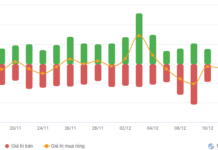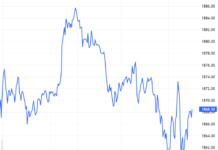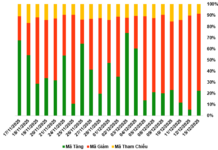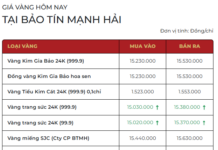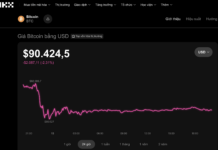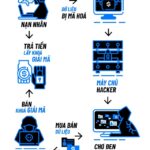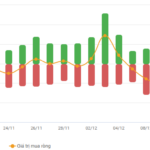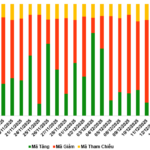This afternoon of August 5th, the Hanoi People’s Court sentenced former FLC Chairman Trinh Van Quyet and 49 accomplices for Fraud and Stock Market Manipulation.
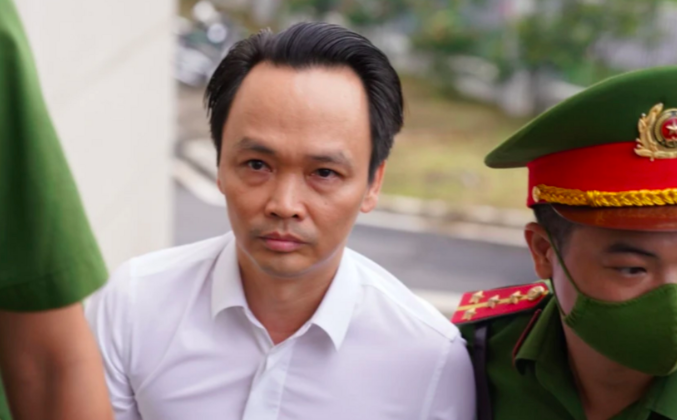
Defendant Trinh Van Quyet being led to the court session
Accordingly, the Hanoi People’s Court sentenced Trinh Van Quyet to 18 years in prison for Fraud and 3 years for Stock Market Manipulation, totaling 21 years for both charges.
Trinh Thi Minh Hue (Quyet’s sister) was sentenced to 11 years and 6 years, respectively, for the two charges, totaling 14 years in prison.
Another sister of the defendant, Trinh Thi Thuy Nga, received a sentence of 6 years for Fraud and 2 years for Stock Market Manipulation, resulting in a total of 8 years of imprisonment.
In terms of civil liability, for the act of Fraud, the defendants, with Trinh Van Quyet taking primary responsibility, must compensate the victims with over VND 1,785 billion.
Regarding Stock Market Manipulation, investors have the right to file a civil lawsuit. Trinh Van Quyet is held primarily responsible, and the authorities have the right to pursue further collection.
According to the verdict, Trinh Van Quyet inflated the charter capital of FLC Faros Construction Joint Stock Company to list the ROS stock code on the stock exchange, aiming to collect money from investors. FLC Faros was established in 2011 with a charter capital of VND 1.5 billion. During the 2014-2016 period, Mr. Quyet proceeded to artificially increase the company’s charter capital to VND 4,300 billion, equivalent to 430 million shares. When FLC Faros listed 430 million shares with the ROS code on the stock market, Trinh Van Quyet directed the sale and appropriated more than VND 3,600 billion from investors.
The first-instance court assessed that during the trial, the panel of judges determined that Trinh Van Quyet was the mastermind behind the scheme to inflate and use fake capital contributions to increase the charter capital of Faros Company from VND 1.5 billion to over VND 4,300 billion, illegally earning more than VND 3,600 billion. The remaining defendants were considered active accomplices.
Concerning Stock Market Manipulation, the verdict stated that the defendants’ actions undermined state management effectiveness, caused public outrage, and eroded investors’ confidence. The case resulted in investors losing VND 684 billion due to the defendants’ manipulation of the stock market.
During the investigation, the defendants cooperated and confessed to their crimes. Trinh Van Quyet took the initiative and encouraged his family to compensate for the damage caused by the case. His family has made contributions to the revolution and actively engaged in charitable activities, and the local authorities have submitted petitions for leniency in criminal responsibility.
The court acknowledged the request of Trinh Van Quyet and his wife to cancel the seizure of their FLC shares to compensate for the damage. However, these assets have been mortgaged to banks, so they are prioritized as collateral for the third party, which is the bank.
Big 4 Real Estate Giant Selling Prime Land Lots in Beautiful Da Nang City on the Eve of Tet Holiday
A series of prime real estate properties situated on major roads in the cities of Danang and Quang Nam are being auctioned off by Agribank to recover outstanding debts. These land plots are owned by real estate tycoons.
Common Scams to Watch Out for During the 2024 Lunar New Year Online
As the Lunar New Year approaches, cybercriminals are ramping up their activities in cyberspace, causing a significant impact on people’s lives. The rise in cybercrime has become more sophisticated and complex, posing a threat to individuals and their personal information. It is crucial for us to be vigilant and take proactive measures to protect ourselves and our online presence.
A Bank Assistant Manager Deceives and Steals Over Billions of Dong
During his time as an assistant manager at a bank in Kon Tum province, Nguyen Van Ton provided false information in order to borrow money from customers to pay off the bank’s debts. Trusting him, four individuals lent Ton over billions of Vietnamese dong.

